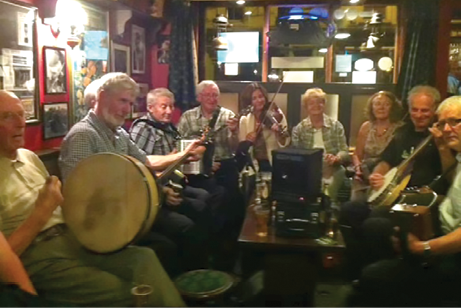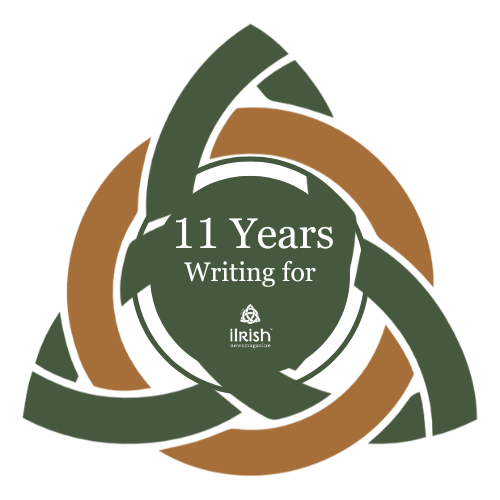One lovely June evening, we found ourselves walking away from a riverfront music festival and into an inevitably dank, clichéd hotel bar. It felt counterintuitive to say the least, but we were heading toward a promise, the promise of a great Irish music session. It’s a powerful lure.
As we entered, we saw a family, young and old, stuffed into a few corner booths, instruments in their laps at the ready. Then the music began, and the promise delivered.
The session was led by a character who was almost mythical in Irish traditional music circles, Frank Custy. Thinking back on that hotel bar session, I remember that it was wonderful, but I don’t remember anyone standing out. What I remember is the enthusiasm that they had for playing together, how they enjoyed it.
At that time, Frank was in America with his brother Sean, visiting his nephew Pat and wife Nikki. If you are into traditional Irish music, called Trad for short, and live in NE Ohio, you have at least heard of Pat and Nikki, or one of their bands.
Traditional music is the Custy family business. Once when we were in Ireland, we visited the Custy homestead in Clare. The visit is best summed up by my husband’s comment, “Well, it’s no surprise that they got good at music cause there’s nothing here to distract them.”
Ennis
The part of Clare that they come from is called Dysart. The house sits near the end of a long winding road that wraps around a big, wooded hill, nice and quiet. The nearest big town is Ennis.
Clare itself has a reputation for being a place to go for Trad music. The county hosts loads of annual music festivals, including the infamous Lisdoonvarna Festival. Plenty of homegrown musicians play at those festivals too.
Within that community, the Custys are known for both their music and the music shop that they have in Ennis. The shop houses one of Ireland’s only didgeridoos.
You are probably thinking that since Frank was born and bred a Clare man and well-known for music, that he was born playing it. You would be wrong.
Born in Dysart in 1939, his early passion was hurling. He was good at it too, winning multiple championships beginning in his teens. He played goalkeeper, a position that requires stamina and resilience.
Music did not enter Frank’s life until after he was hired as a teacher in Offaly. A monk put out a call that he wanted a hurler who could teach for a National School position. Perfect.
Teaching Music
Frank was happy enough teaching. But soon the monk who hired him wanted more. He thought that it would be great if Frank could add music to his teaching. What the monk didn’t know was that Frank failed the singing part of his exam to be a National School teacher.
He hadn’t failed music though. Frank figured that he could learn to play quickly enough. He only had to stay a step ahead of the students to be able to teach them.
So began Frank’s musical career. He started learning in 1963, at the age of 25. Being in a hurry to learn and a late starter as well undoubtedly influenced Frank’s philosophy of learning music.
He saw that learning to read sheet music, staff notation, could be an obstacle to some students learning to play, especially since there was so much frontloading to be done with that approach. Learning to read music most often meant that it took students forever to get to interact meaningfully with an instrument.
So, instead he developed his own way of writing down a simpler notation, an ABC style approach. He published three books of music using that style. He encouraged students to play by ear as well. His goal was to keep things as simple and accessible as possible.
Luck was with Frank. He ended up spending a few years in Offaly before he was able to return to Clare to work, at Toonagh National School. He applied what he learned about teaching and built upon it.
When he retired in 1999, Frank had been at the Toonagh National School for 40 years as both teacher and headmaster. His nephew Pat was in his classroom for a few of those years.
And what a classroom it must have been. Every day started with a session. Instruments were out and available for student use throughout the school day.
Sharon Shannon
Participation was key, everybody played and had something to contribute. Music should just be for the already gifted.
That egalitarian sensibility was something that struck one his notable students, Sharon Shannon. She talked about how music teachers that she knew wanted talented students.
Frank did not see things that way. He saw music as a way to let individual students do what they could. He valued all the contributions. Sharon said that Frank talked to students as people with dignity, at a time when that was not always the way in Irish schools.
Music was what Frank used to build community. Excellence was a side matter. However, some very prominent traditional musicians were taught by Frank, including Sharon Shannon, Siobhan Peoples, and members of the Kilfenora Ceili Band to name a few.
Enthusiasm for music grew from that school and expanded into the community. Frank started a Friday session to give the students a chance to play together and meet up. Former students talked about how much they enjoyed playing in those sessions and wouldn’t miss them for anything.
The popularity of those sessions spread, and they became a venue for anyone who wanted to go. Play the banjo, violin or spoons, if need be, but play.
The sessions were still going on at the time that Frank passed away late in February. They are a delightful to watch. Frank’s passing was commemorated by every paper in Clare. He was eulogized passionately by musicians and others who knew and loved him. My impression of him was that he was a warm and genuine person.
I have been intrigued and impressed by Frank for a long time. As a teacher, watching him leverage the arts in such a positive way, was amazing.
The arts in education tend to be the first disciplines to be cut when schools feel pressured. The reform trends in education try to fit cookie-cutter solutions to issues in schools that require the personal and unique. Solutions need to be genuine to be effective.
Frank used his passion for music to engage his students. I think that playing and teaching sports had already shown him the value of participation for each student. Being part of a team gives students a sense of worth and belonging.
I bet there was no need for truancy officers in Toonagh. If we are willing and accepting, everyone can play.
ends




